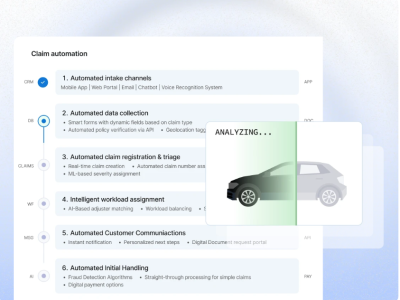In order to provide scalable, accessible, and efficient learning experiences, businesses, organizations, and educational institutions in the current digital era now depend heavily on Enterprise Learning Management Systems (LMS).
Through the simplification of content administration, tracking, and distribution for everything from staff training programs to academic courses, an LMS enhances learner engagement.
This post will go over the top 20 benefits of using an LMS and how it may revolutionize training and development in a variety of sectors.
Table of contents
- 1. Centralized Learning Platform :
- 2. Accessible and Flexible :
- 3. Education on Economics :
- 4. Capacity for Scaling :
- 5. Customized Learning Prospects :
- 6. Tracking and Reporting on Results :
- 7. Standardized Instruction :
- 8. Training on Compliance :
- 9. Interactive, Interesting Content :
- 10. Encouragement of Blended Education :
- 11. Making Use of Mobile Schooling :
- 12. Time is saved by administrators and instructors :
- 13. Constant Learning :
- 14. Streamlining through the Cloud:
- 15. Labeling and Personalisation :
- 16. Information That Can Be Changed Easily :
- 17. Better Learner Retention :
- 18. Seamless LMS Integration with HR, CRM, and Communication Tools:
- 19. Help with Various Forms of Education :
- 20. Environmentally Friendly :
- Conclusion

1. Centralized Learning Platform:
All courses, learning resources, and other materials can be stored in one central area with an LMS.
This makes managing and organizing educational resources easier by enabling teachers and students to access content from the same place.
2. Accessible and Flexible:
Anytime, from any place, students can access content using an LMS as long as they have an internet connection.
It is easier for employees or students to fit education into their busy schedules thanks to this flexibility, which promotes lifelong learning.
3. Education on Economics:
The cost of traditional training or instructional methods can be greatly reduced using an LMS.
Without requiring tangible resources, travel, or on-site trainers, an LMS offers affordable learning and development solutions that are easily scalable to new teams or student groups.
4. Capacity for Scaling:
Training thousands of employees or just a few hundred may be accomplished with an LMS because it is very scalable.
Because it makes it possible for businesses of all sizes to launch new training courses or programs to large audiences without encountering logistical difficulties, it is ideal.
5. Customized Learning Prospects:
Many learning management systems (LMS) provide for customized learning paths based on the needs, interests, or proficiency levels of the student.
By doing this, it is ensured that each student has a unique experience that maximizes engagement and improves learning results.
6. Tracking and Reporting on Results:
LMS solutions offer robust tracking and reporting capabilities that let supervisors or teachers monitor student progress, identify knowledge gaps, and assess overall performance.
This data-driven approach helps refine the learning approach for better results.
7. Standardized Instruction:
Organizations can use an LMS to ensure that all students, regardless of where they are located, receive the same training materials.
Particularly important is keeping a constant level of education and skill sets for businesses that employ remote workers or have many offices.
8. Training on Compliance:
An LMS could be a very helpful tool for making sure that a business complies with industry norms or legislation. Automated compliance training lowers legal and financial risks for firms by constantly updating materials and monitoring who has completed required courses.
9. Interactive, Interesting Content:
Modern learning management system platforms support a variety of content formats, such as discussion boards, videos, assessments, and gamified learning opportunities.
The learning process is made more engaging and enjoyable by these components, which promote student participation.
10. Encouragement of Blended Education:
Many learning management system (LMS) systems allow blended learning, which blends online and in-person training for a more comprehensive approach to student learning.
Businesses can adapt to different learning preferences by combining online learning with in-person interactions.
11. Making Use of Mobile Schooling:
Thanks to mobile compatibility, students can access their courses on smartphones or tablets while they’re on the road.
Mobile learning makes it easier for employees or students to complete courses during their commutes or free time, which increases course completion rates.
12. Time is saved by administrators and instructors:
An LMS automates a number of administrative tasks related to organizing training programs, including grading assessments, tracking completion rates, and sending out reminders.
This automation saves time, allowing instructors and administrators to focus on producing content and helping students.
13. Constant Learning:
By providing opportunities for students to review content, hone skills, and take advantage of continuing education opportunities, an LMS promotes lifelong learning.
In a rapidly evolving world, it is essential for both employees and learners to preserve their current skill sets.
14. Streamlining through the Cloud:
The cloud-based nature of many LMS solutions eliminates the need for software installation on individual devices.
Cloud-based learning management system (LMS) systems boost accessibility and convenience by allowing students to access their accounts from any device with an internet connection.
15. Labeling and Personalisation:
Companies can personalize their LMS by branding and altering it.
This makes it possible for businesses to tailor the learning process for their students by altering dashboards, colors, and logos to reflect their corporate identity or the way they teach.
16. Information That Can Be Changed Easily:
Maintaining up-to-date learning resources is easy when utilizing an LMS.
When new training modules are added or compliance laws are changed, content can be swiftly updated with the aid of an LMS to guarantee that students always have access to the most recent knowledge.
17. Better Learner Retention:
By incorporating interactive tests, gamification, and certificates for finishing the course, you may improve learner retention.
Involving students in the process and rewarding them for their achievements increases their likelihood of finishing courses and remembering the content taught.
18. Seamless LMS Integration with HR, CRM, and Communication Tools:
Combining This Tool with Another LMS platforms often interface with commercial and educational technology, including as HR management systems, CRM platforms, and even communication tools like Microsoft Teams or Slack.
This simplifies procedures and ensures a seamless experience for administrators and students.
19. Help with Various Forms of Education:
An LMS can be used to distribute a variety of content types, including files, presentations, e-books, videos, and podcasts.
Students with different learning styles and interests can engage with the content in ways that suit them best because many formats are supported.
20. Environmentally Friendly:
By doing away with physical teaching aids, printed materials, and face-to-face training, an LMS is able to support a more sustainable and ecologically conscious approach to education.
Because it produces less trash, digital learning is a more ecologically responsible option than traditional teaching methods.

Conclusion
A Learning Management System may be a huge asset to companies, educational institutions, and training groups looking to provide engaging, scalable, and successful learning experiences.
The way that students access and absorb information is revolutionized by an LMS, a powerful instrument.
Improved accessibility, cost reductions, customized learning pathways, and advanced performance tracking are just a few of its benefits.
A firm looking to train its staff, an educational institution offering online courses, or a nonprofit providing skills development can all benefit from using an LMS to enhance learning outcomes and ensure long-term success.
You can choose the top LMS in the UAE to enhance your learning journey.








